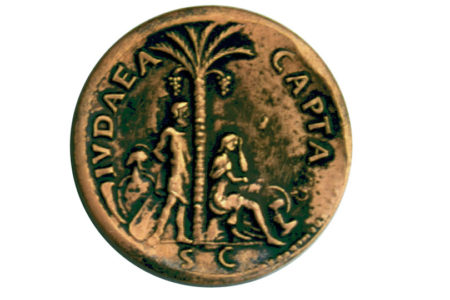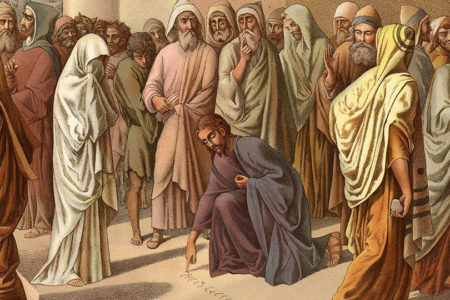Voices from the Sideline
Last December, a group calling themselves “Christians for Middle East Peace” placed an ad in the New York Times calling for Christians to lobby Washington to politically partition Jerusalem into capitals for Israel and a Palestinian state. The ad further called for a Jerusalem shared religiously by Muslims, Christians, and Jews, with exclusivist claims rejected. Those responding to the ad were urged to recommend to the U.S. Senate Foreign Relations Committee that their concepts figure into confirmation hearings for the next Secretary of State.
As one would expect, major Jewish groups did not take kindly to this “Christian” initiative, which presumed to meddle in affairs critical to the peace process and the State of Israel. Rabbi James Rudin, Director of Inter-Religious Affairs at the American Jewish Committee, charged that Christians for Middle East Peace has “had a long record” of opposition to Israeli interests. “They cannot,” Rudin said, “stand Jews with power. That’s their dirty little secret. They can deal with Jews as a minority, as individuals, as purely a religious group, but when they see Jews with power, especially over Jerusalem, it sticks in their throat.”
Many evangelicals bristled at the thought that CMEP would take it upon themselves to speak for Christians in general while actually representing groups with well-documented track records for being less than evenhanded on virtually any issue related to Israel. It goes without saying that they did not speak for the millions of evangelical Christians who hold convictions diametrically opposed to views presented in the New York Times ad. Nor were they circumspect in avoiding inaccuracies or inappropriate assumptions. There is presently no Palestinian state. Neither is there a mandate for a divided Jerusalem. By formal agreement, final status matters on full Palestinian autonomy and Jerusalem will be negotiated by qualified representatives of the Israelis and Palestinians.
The issue of a religiously shared Jerusalem is a misrepresentation of facts on the ground in Israel. Today, Muslim shrines are under the control of Muslim authorities. Although not generally reported in the secular media, King Hussein of Jordan is in control of the mosques on the Temple Mount in Jerusalem. Christian sacred places are controlled by Christians, not by the government of Israel. Since 1967, Jews have been free to rebuild synagogues that were systematically destroyed by Arab military forces that held Jerusalem prior to that time. Israel does not need lectures or lobbying from people with more zeal than knowledge regarding religious shrines. Israeli governments, led by both Labor and Likud, have set an admirable standard when it comes to respecting the rights of Muslims and Christians.
Scanning the names of the religious leaders who signed the ad is revealing. The majority were members of liberal “mainline” Protestant denominations. A telling factor in their obvious attitude problem toward Israel is the fact that the State of Israel is a theological embarrassment to them. Their decades-old repudiation of the importance of Scripture opened the door for the fantasy that assumes God is through with Israel. Therefore, in their view, the church has become the sole repository of divine favor and privilege. To their way of thinking, the Bible’s clear teaching about a future divine destiny for Israel—a King and a Kingdom—is the stuff of Neanderthal religious mythology. Thus, when little Israel defied all odds and came back from the dead, liberal Protestant mainliners found themselves shouting from the sidelines—protesting that Israel and her Jews had the audacity to debunk, with real history, their elitist secularized theology. From signing onto the infamous “Zionism is Racism” resolution in the United Nations a few years ago, to numerous associations with radicals opposed to the survival of Israel, mainline liberals have vented their animosity. The New York Times ad is but another bit of evidence.
Perhaps, for obvious reasons, it is time to take another look at the term mainline. The word carries a sort of prestigious implication. That is, when mainline Protestant leaders speak, theirs is the voice of mainstream American Christians. If you turn back the calendar a few generations, that would have been true. It is not true today. Increasingly, liberal Protestant leadership has, in defiance of the biblical Judeo-Christian heritage we have known, identified with radical social revolutionaries driven by the secular-humanist agenda.
David Klinghoffer, in a Wall Street Journal article, “Trendy Sermons, Vacant Pews” (January 3, 1997), makes a case for the absence of mainstream America from the pews of mainline churches. Klinghoffer points out that when denominations endorse homosexual ordination and gay marriage, laud Roe v. Wade, invoke the blessing of the Greek earth goddess Gaia on women’s conferences, feature the veneration of “Sophia, Creator God,” or borrow rites from other religions such as the American Indian tobacco ritual, they are swimming out of the mainstream.
Klinghoffer, quoting from Thomas C. Reeves’ book, The Empty Church: The Suicide of Liberal Christianity, sums up:
“The typical congregant at a liberal church…finds it increasingly hard to see why he should spend his Sunday morning…in a place where secular views are simply echoed.
“Weigh the benefits. Sunday with the family at the beach or in church listening to a sermon on AIDS; working for overtime wages or enduring pious generalities about ‘dialoguing,’ ‘inclusiveness,’ and ‘sharing and caring’ studying for exams or hearing that the consolations and promises of the Bible are not ‘really’ or ‘literally’ true.”
“Liberal Protestantism,” Reeves adds, “has succeeded in making itself dispensable.”
In so doing, they have become not truly mainline, but only strident voices from the sideline.







